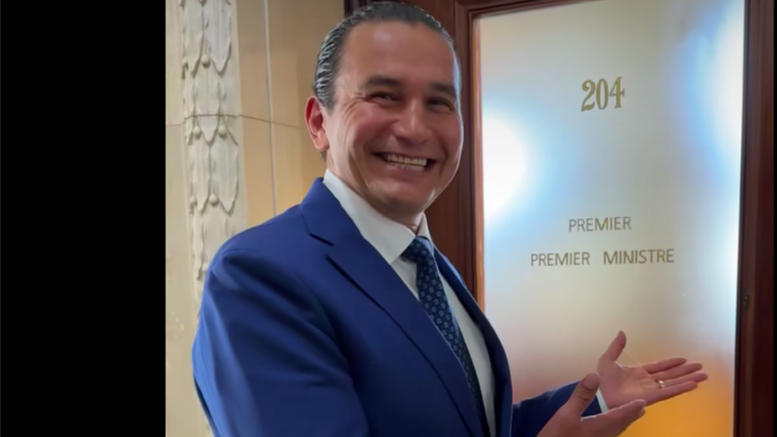By Jeremy Appel, Local Journalism Initiative Reporter
(ANNews) – On Oct. 3, Manitoba NDP leader Wab Kinew became the first member of a First Nation to become premier of a province.
Kinew’s NDP won a majority government with 34 seats of 57 in the Legislature, with the governing PCs taking 22 and Liberals taking one. However, the popular vote was closer, with the NDP taking 45.5 per cent to the PCs’ 42.1 per cent and Liberals’ 10.6 per cent.
Kinew, a member of the Onigaming First Nation near the Ontario-Manitoba border, defeated incumbent PC premier Heather Stefanson, who campaigned in part on refusing to search the Prairie Green Landfill near Winnipeg for the remains of two First Nations women.
A PC election advertisement in the Winnipeg Free Press called the search for Morgan Harris, 39, and Marcedes Myran, 26, both of whom are believed to have been murdered by alleged serial killer Jeremy Skibicki, an “unsafe $184-million landfill dig.”
Niigaan Sinclair, a professor of Indigenous studies at the University of Manitoba, told CBC News that this decision spelled “doom” for the incumbent government.
“They came across as frankly thoroughly racist and for most of urban Winnipeg this was an absolute turnoff,” said Sinclair.
The NDP campaign focused largely on health care, with a central promise to reopen three emergency rooms the PCs shuttered.
Stefanson, who held onto her seat by less than 300 votes, announced once the results came in that she was stepping down as leader.
The Confederacy of Treaty No. 6 Nations, which represents First Nations in Alberta and Saskatchewan, called Kinew’s victory a “proud moment for Indigenous Peoples across Turtle Island,” predicting a “positive ripple effect for the seven generations to come.”
“The Confederacy acknowledges the significance of this moment and how it will empower our Peoples to see themselves in spaces Indigenous People are not typically in,” reads an Oct. 5 statement.
A former rapper, broadcaster and author, Kinew won the Manitoba NDP leadership in 2017 — a year after the PCs came to power under Stefanson’s predecessor, Brian Pallister.
Stefanson’s campaign attempted to use Kinew’s history of addiction and crime, including domestic violence, refusing to take a breathalyzer test and an assault on a taxi driver, to portray him as untrustworthy. “Don’t gamble on the NDP,” said one attack ad. “You will be dealt a very bad hand.”
Kinew used these attacks to tell a story of personal redemption.
In election night comments geared towards struggling Indigenous youth, Kinew said he was “given a second chance in life.”
“I would like to think that I’ve made good on that opportunity. And you can do the same,” Kinew said.
“My life became immeasurably better when I stopped making excuses and I started looking for a reason. I found that reason in our family. I found that reason in our community. And I found that reason in our province and country.
“But here’s the thing,” he added. “You have to want it.”
On Oct. 5, B.C. the Union of Indian Chiefs (UBCIC) issued a statement, in which Grand Chief Stewart Phillip hailed Kinew’s “groundbreaking victory.”
“It is important to reflect on what this victory means. Despite the devastating, violent and pernicious impacts of colonialism, including genocide and taking away our children, we as First Nations have survived,” said Phillip.
“Wab Kinew’s victory is a big step forward. We are just beginning to dismantle the racism that was and is a tool of colonialism and oppression, and we are working hard to make societal and institutional changes. This was a victory against white supremacy, one that we have all been fighting for.”
UBCIC vice president Chief Ton Dom criticized the PCs’ election “platform of distrust and discrimination,” noting the party’s refusal to search the landfill and opposition to “common-sense sex education” under the guise of parental rights.
“They assumed what matters most to voters is the status quo, and a few years ago, they may have been right, but Manitobans proved them wrong. I lift my hands with gratitude, this is a moment of hope for the future,” Dom said.
Chief Marilyn Slett, UBCIC’s secretary treasurer, said her “heart has ached for First Nations people in Manitoba as their previous provincial government callously disregarded and disrespected Missing and Murdered Indigenous Women and Girls, refusing to even consider or meaningfully collaborate on a landfill search for our sisters’ bodies.”
But, she noted, the day after Kinew’s election, the federal government announced $740,000 in funding to re-examine the possibility of searching the landfill.
“The road ahead is long, but through genuine collaboration, we can show the world that Indigenous women are not disposable and that all things are possible when we work together,” Slett said.



Yey Premier Kinew!! I am out of province but I would have voted for you in a heartbeat! I am thrilled for you and the province of Manitoba.
a murderer, who spent time in jail for multiple assault charges. I am friends with a family member
good on you.